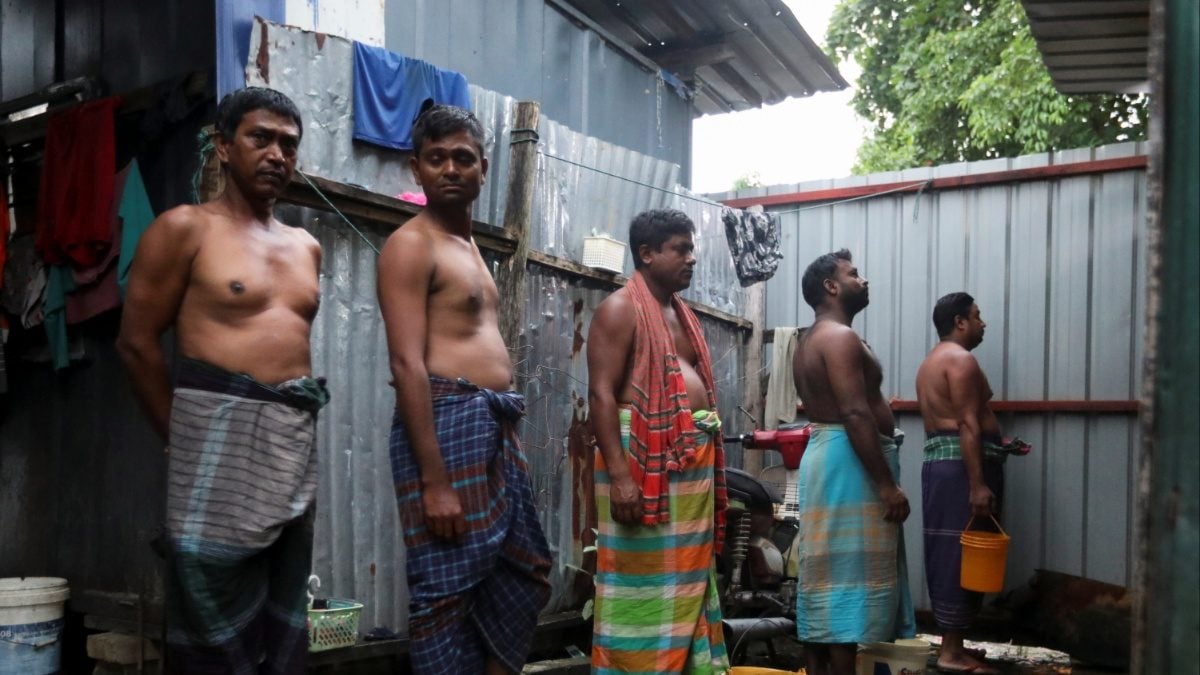[ad_1]

Migrant workers wait for their turn to use one of the four toilets shared among 104 construction workers at their dormitory in Kuala Lumpur, Malaysia. (Image: Reuters)
The UN organisation ILO said excessive working hours, unpaid overtime, low wages, restricted movement, and being unable to quit are indicators of forced labour conditions.
Nearly a third of migrant workers employed in domestic households in Malaysia are working under forced labour conditions, according to a survey released by the United Nations’ labour agency on Thursday.
The International Labour Organisation (ILO) identified conditions such as excessive working hours, unpaid overtime, low wages, restricted movement, and being unable to quit among its indicators of forced labour.
The survey, based on interviews with 1,201 domestic workers in Southeast Asia, found 29% of those in Malaysia faced such conditions, compared to 7% and 4% in its neighbours Singapore and Thailand, respectively.
Malaysia did not immediately respond to requests for comment on the survey findings.
Wannarat Srisuksai, a spokesperson for Thailand’s labour ministry, said the treatment of domestic workers in the country has improved following laws introduced in 2012 to protect the group.
Singapore’s Ministry of Manpower said the vast majority of migrant domestic workers were satisfied with working and living in Singapore, with protections including timely salary payment, adequate daily rest, proper food and accommodation, and regular medical check-ups.
In all three countries, however, the domestic workers surveyed on average worked hours “well in excess” of those legislated for other workers, and none earned the minimum wage, the ILO said.
“Domestic work is one of the most important tasks in our society, and yet provided with the least protection. This can no longer be accepted,” said Anna Engblom, chief technical adviser at the ILO programme, which conducted the study.
The ILO urged Malaysia, Singapore, and Thailand to ratify U.N. conventions on domestic workers and forced labour, to recognise the skilled nature of domestic work, and ensure migration pathways that did not tie the workers to their employers.
Households in Asia often employ domestic workers – usually women from developing nations such as Indonesia, Myanmar, and the Philippines – to carry out housekeeping tasks including cooking, cleaning, childcare, and gardening.
Malaysia has faced criticism in recent years following multiple incidents of Indonesian domestic workers being abused in Malaysian households, while several of its companies have been accused of exploiting migrant labourers.
Indonesians make up about 80% of domestic workers in Malaysia, according to the ILO. Last year, Malaysia and Indonesia signed an agreement to improve protections for domestic workers.
(This story has not been edited by News18 staff and is published from a syndicated news agency feed – Reuters)
[ad_2]
Source link





